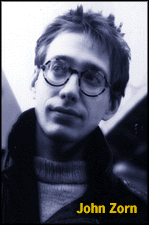
Basic Overview // Championing the Obscure

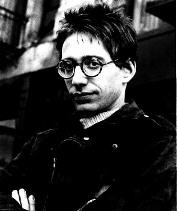 occasionally
blurring the distinctions between them. He has composed for jazz ensembles,
symphony orchestras, rock bands, and films. The only constant in his music
is a restless desire to move forward, to experiment with sound, in all
of its various manifestations.
occasionally
blurring the distinctions between them. He has composed for jazz ensembles,
symphony orchestras, rock bands, and films. The only constant in his music
is a restless desire to move forward, to experiment with sound, in all
of its various manifestations.
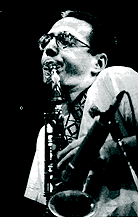 him
to walk away or sit and listen.
him
to walk away or sit and listen.
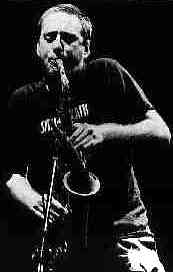 new
music. Most of his music from this time is highly theoretical, resulting
in what most would dismiss as pure noise, just a lot of warped instruments
being banged around. A lot of it was tied to performance art, making the visual
aspects of the piece just as important as the musical aspects. One example is a
piece where he sawed a telephone book in half. One of his major creations from
this time period was the Game Piece, or a musical game, where the object is not
to win, but to move the music in a certain direction. Game Pieces are played
exactly like sports, with a set of rules, but no predetermined sounds or
outcomes. There are just as many variations in a Game Piece as in a game of
baseball. The sound is determined by the improvising musicians as the piece is
performed.
new
music. Most of his music from this time is highly theoretical, resulting
in what most would dismiss as pure noise, just a lot of warped instruments
being banged around. A lot of it was tied to performance art, making the visual
aspects of the piece just as important as the musical aspects. One example is a
piece where he sawed a telephone book in half. One of his major creations from
this time period was the Game Piece, or a musical game, where the object is not
to win, but to move the music in a certain direction. Game Pieces are played
exactly like sports, with a set of rules, but no predetermined sounds or
outcomes. There are just as many variations in a Game Piece as in a game of
baseball. The sound is determined by the improvising musicians as the piece is
performed.
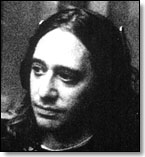 person
rock band that began to acquire a punk following. They broke up in 1993,
to be followed by Zorn's next big project, Masada, an exploration of Jewish
cultural identity through a series of compositions that number over two
hundred.
person
rock band that began to acquire a punk following. They broke up in 1993,
to be followed by Zorn's next big project, Masada, an exploration of Jewish
cultural identity through a series of compositions that number over two
hundred.
After rereading my original "Who Is This John Zorn Guy?" essay, I realized
I was leaving a lot out, but a complete survey of every aspect of Zorn's
work would end up being very lengthy and time consuming. Anyway, I've decided
to include this as a supplement to that essay, in order to expand on some
of the themes in Zorn's work. I plan to maybe later add essays on other
themes in Zorn's work, but that's another one of those "if I get around
to it" projects.
Championing the Obscure
Since 1995, Zorn has been the executive producer of Tzadik, a record label he founded whose raison d' etre was to give avant-garde and experimental music a forum. In his JazzTimes interview with Bil Milkowski, Zorn talked a lot about his desire to simply give a lot of artists a chance, to expose the world's ears to something actually new. So much of Zorn's work has been about championing types of music, from his resurection of hard bop composers from artistic obscurity on News For Lulu to his Ennio Morricone tribute album, that this should come as no surprise to anyone who has been following Zorn's work.
This label celebrates the unconventional, and in a world where so much of the music and information we get is from certain large corporate interests that for various reasons need to package and categorize music into certain acceptable and definable genres, and exclude everything that doesn't fit those genres, it is very refreshing to have a domestic label stuff that isn't categorized. Zorn himself chaffed at the way Nonesuch packaged him, he once said that they were trying to turn him into "the poster boy for postmodernism."
Zorn's label many times releases unconventional albums by certain well known artists, albums that tend to break popular conceptions of what that artist sounds like. Who else would have released an album of solo compositions by the Soul Coughing sampler Mark De Gli Antoni, and allowed still him to explore his artistic vision so different from that of Soul Coughing?
For that matter, who else would release a compilation of compositions by the late Jerry Hunt, an avant-garde American wacko who no one has ever heard of? And where else can you find domestic US releases of obscure (by US standards) Japanese hardcore and noise? I don't even like a lot of the stuff on Tzadik, but Zorn is definitely getting it out there. I once checked out Zuba Zuvi from my school library.It's part of Tzadik's "New Japan" series, and features Ruins drummer Yoshida Tatsuya; good start. My reaction to the album was one big why? The album is simply three guys who aren't particularly good singers (passable) doing a full album of a capella compositions whose quality ranges from "oh that's... interesting" to downright silly. The composition "Europe" has four sections, each based on a European country. Take any stereotypes you have about Germany: martial, angular language, etc., then write a vocal piece around it. Not everyday does one get to hear a recording of three grown Japanese men do grunting an capella vocal piece in German in imitation of German accents.
But this is why I love Tzadik. Zorn puts out some music that I detest,
but, whether I like it or hate it, I've heard it, and I can learn something
from it. Besides, how often do you get music that truly challenges the
way you think about music? A lot of Zorn's composing challenges the way
you conceive of music, but like anything, it eventually becomes familiar
and accessible to your ears. I thought Torture Garden was ridiculous at
first, but now I sometimes use it as background music. "Radical" and "challenging"
are constantly shifting terms; once we get used to something, it ceases
to challenge us. Zuba Zuvi was bad, but it had some interesting ideas in
it, and it forced me to broaden my definition of music. For those of us
who like to explore music's fringe, we have to make sure we're not becoming
complacent in our avant-gardeness. Thank god there are artists who continually
seek to challenge their audience with new definitions of what music and
art can be. And thank god Zorn is here to give them domestic distribution.